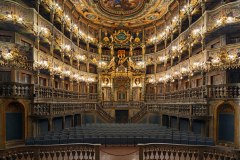Julia Lezhneva and Franco Fagioli
September 2025 | ||||||
|---|---|---|---|---|---|---|
Mo | Tu | We | Th | Fr | Sa | Su |
Julia Lezhneva & Franco Fagioli - Duetti and Arie | Concert
Stefan Plewniak | Orchestre de l’Opéra Royal
Margravial Opera House Bayreuth
Nicola Antonio Porpora was born in 1686 in a poor quarter of Naples, where he also died in 1768 – likewise in utter poverty. In the years between, he advanced to become one of the most influential exponents of the Italian opera seria, working from his home city at first in centres like Rome and Venice and vying with Leonardo Vinci for the rank of the most important Italian composer of the age. In 1733 he was called to London as a rival to George Frideric Handel and to intrigue against his operatic empire.
Besides working as a composer, Porpora was famed especially as an intimidating singing teacher, who, although he used to maltreat his pupils, was able to bring out the best in them. Among his pupils were castrato stars – some of whom are still famous today – including Farinello, Caffarelli and Antonio Uberti, who took the stage name of Porporino as homage to his teacher. Porpora’s music was extremely popular among the singers of his era; as a singing teacher and connoisseur of voices he responded in his operas to the specific qualities of the relevant cast, flattered the singers’ voices and whipped their vocal skills to attain the maximum of achievement. The Russian soprano Julia Lezhneva and the Argentinian countertenor Franco Fagioli evoke the profound feelings of Porpora’s arias to resound in altissimo, with beauty of tone and technical brilliance.
With duets and arias from Nicola Antonio Porpora’s operas Polifemo and Carlo il Calvo
Program and cast
Julia Lezhneva - Soprano
Franco Fagioli - Countertenor
Stefan Plewniak - Conductor and Violin
Orchestre de l’Opéra Royal
Margravial Opera House
It was built according to plans designed by the French architect Joseph Saint-Pierre (ca. 1709 – 1754), court builder of the Hohenzollern margrave Frederick of Brandenburg-Bayreuth and his wife Princess Wilhelmine of Prussia. It was inaugurated on the occasion of the marriage of their daughter Elisabeth Fredericka Sophie with Duke Charles Eugene of Württemberg.
The wooden interior was designed by Giuseppe Galli Bibiena (1696 – 1757) and his son Carlo from Bologna in an Italian Late Baroque style. The box theatre is completely preserved in its original condition, except for the curtain which was taken by Napoleon's troops on their march to the 1812 Russian campaign. The prince box was seldom used by the art-minded margravial couple, who preferred a front-row seat.
Princess Wilhelmine, older sister of the Prussian king Frederick the Great, had established the margravial theatre company in 1737. In the new opera house she participated as a composer of opera works and Singspiele, as well as an actor and director. Today she features in a sound-and-light presentation for tourists. After her death in 1758, performances ceased and the building went into disuse, one reason for its good conservation status.
More than one hundred years later, the stage's great depth of 27 metres (89 ft) attracted the composer Richard Wagner, who in 1872 chose Bayreuth as festival centre and had the Festspielhaus built north of the town. The foundation stone ceremony was held on 22 May, Wagner's birthday, and included a performance of Beethoven's Symphony No. 9, directed by the maestro.
Parts of the 1994 biopic Farinelli were filmed in the Opera House. The theatre was the site of the annual Bayreuther Osterfestival until 2009. Each September from the year 2000 to 2009, the theatre also hosted the Bayreuth Baroque festival, with performances of early operatic rarities. The 2009 festival included performances of Andrea Bernasconi's festa teatrale, L'Huomo, to a libretto by the Margravine Wilhelmine.
The theatre closed between October 2012 for extensive refurbishment and redevelopment and reopened 12 April 2018.

 EN
EN DE
DE IT
IT FR
FR ES
ES RU
RU JP
JP RO
RO
 Seating plan
Seating plan 
